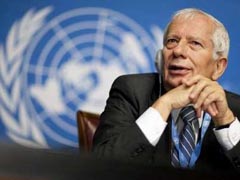We all have a duty to choose our words carefully - and that includes those making the accusation of anti-Semitism.
by Martin Pollard, WCIA Chief Executive
A few days
ago I found myself caught up in an argument on Facebook – one of those you sort
of do, sort of don’t go looking for – about David Ward’s comments on Holocaust
Memorial Day. In case you’ve missed this particular controversy, Ward is the
Liberal Democrat MP for Bradford East who posted the following on his blog:
“…saddened
that the Jews, who suffered unbelievable levels of persecution during the
Holocaust, could within a few years of liberation from the death camps be
inflicting atrocities on Palestinians in the new State of Israel and continue
to do so on a daily basis in the West Bank and Gaza".
This is arguably
a fair comment about Israel, but wrapped up in an unfortunate choice of words
which could certainly be construed as anti-Semitic. Making any blanket
reference to “the Jews” sounds clearly like criticism of Jewish people, or
Judaism, as a whole; this may not have been Ward’s intention (his later apology
seemed sincere) but it offended enough people for that not to matter.
It also
undermined his argument. During my minor Facebook altercation I was trying to
make the point that this kind of slapdash choice of language does no favours to
those who would engage in a legitimate critique of the state of Israel. By
leaving himself open to accusations of anti-Semitism, or at the very least
insensitivity, Ward lost not only the moral high ground but also the chance to
engage in rational debate about the continuing political and humanitarian mess
in the Middle East. He wanted to draw attention to the plight of Palestinians;
instead he drew the ire of the Holocaust Educational Trust, his own party and a
fair chunk of the general public.
Fast forward to today and we have another ‘anti-Semitic’ controversy, again with the emphasis on unfortunate timing around Holocaust Memorial Day. This time, Rupert Murdoch has apologised for a cartoon by Gerald Scarfe in the Sunday Times (possibly the first time Murdoch has apologised for anything, as fellow cartoonist Steve Bell noted acidly on the Today programme). We are told by the paper’s acting editor Martin Ivens that “Jews (and others) throughout the country reacted to this cartoon with a visceral disgust”.
But on
this occasion, the controversy is in my view wholly unjustified, and raises serious
questions around freedom of speech. Scarfe’s cartoon shows the Israeli prime
minister Benjamin Netanyahu building a wall
containing Palestinians’ blood and body parts. The caption reads: “Israeli
elections. Will cementing peace continue?"
Brutal,
yes. Shocking, perhaps. And understandably offensive to some, especially
considering its poorly-timed publication. But it is highly questionable whether
such an image can be considered anti-Semitic. This cartoon plainly falls in the
category of political comment, not religious or cultural diatribe: it is about Israel
and its actions in the Occupied Territories; more specifically it alludes to Israel’s
continuing policy of building illegal settlements on Palestinian land. It does
not contain a stereotypical image of Jewishness. It contains blood; but
contrary to the view of the Board of Deputies of British Jews, it does contain
a ‘blood libel’.
Anyone comparing Scarfe’s trenchant political point with the
obviously anti-Semitic cartoons produced regularly in Iran and elsewhere is at
the very least disingenuous. More worrying is the pernicious subtext – heard
all too regularly – that in some way to criticise the actions of the Israeli
government is to promote distrust or hatred of Jews.
No-one
should doubt that there are two sides to the Israel/Palestine story, and no
peace activist or anti-Zionist should convince themselves that Israelis are not
themselves under threat, or that their security concerns are not real. It is the
duty of any careful critic to listen to both sides, and certainly to stand firm
against the anti-Semitism that does emerge – sometimes explicitly enough to
cause me a gasp of horror – in public debates about Israel and Palestine.
But
we must also claim, as loudly and vociferously as necessary, the right to
criticise any state that fails to afford protection or equal rights to those
within the borders it controls, or that effectively ghettoises a substantial portion of the population. That criticism can and should be levelled legitimately against the government
of Israel – as it can against other governments – until a lasting peace is finally
achieved. And if we all choose our words carefully, we should do so without fear
of causing irrelevant offence.

